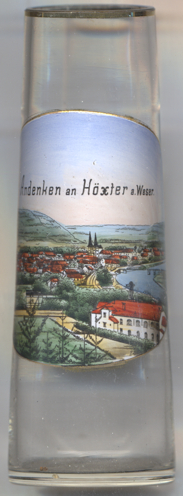

|
| DEUTSCHLAND | GERMANY |
| Bundesland: Nordrhein-Westfalen | North Rhine-Westphalia |
| Regierungsbezirk: Detmold | |
| Kreis: Höxter |
 Höxter is situated at an elevation of 96 m on the river Weser in the wast of Germany's state of North Rhine-Westphalia. It is the
administratve seat of the eponymous district and is located about 40 km southeast of Detmold, the seat of the
administrative region, and about 190 km northeast of Düsseldorf, the capital of North Rhine-Westphalia.
The municipality has a population of 28,600 (2022). The former Princely Abbey of Corvey (today part of Höxter) was listed as a
UNESCO World Heritage Site in 2014.
Höxter is situated at an elevation of 96 m on the river Weser in the wast of Germany's state of North Rhine-Westphalia. It is the
administratve seat of the eponymous district and is located about 40 km southeast of Detmold, the seat of the
administrative region, and about 190 km northeast of Düsseldorf, the capital of North Rhine-Westphalia.
The municipality has a population of 28,600 (2022). The former Princely Abbey of Corvey (today part of Höxter) was listed as a
UNESCO World Heritage Site in 2014.
The settlement of Huxori was awarded to the newly founded Corvey monastery by Emperor Ludwig the Pious in 822.
Under the protection of the Princely Abbey of Corvey it gradually increased in prosperity, and became the chief town of the principality of Corvey.
Later it asserted its independence and in 1295 joined the Hanseatic League. Rivalry with Corvey Abbey and the nearby town known as Corvey increased and
in 1265, the burghers of Höxter allied themselves with the Bishop of Paderborn. Their troops destroyed the town of Corvey
and damaged the abbey. The town never recovered and over the following decades reverted to a small village. This event also marked the beginning of the
long period of decline of the abbey. Höxter suffered severely during the Thirty Years' War (1618–1648). In 1665 the prince-bishop of
Münster, became administrator of the Corvey monastery and thus sovereign of Höxter. in 1802 it passed to Nassau and in
1807 to the Kingdom of Westphalia, after the dismemberment of which, in 1814, it came into the possession of Prussia.
After the Peace of Westphalia in 1648 it was united with
Braunschweig; in 1802 it passed to Nassau and in 1807 to the Kingdom of Westphalia, after the dismemberment of which, in 1814, it came into the possession of Prussia.
[https://de.wikipedia.org/wiki/H%C3%B6xter, https://en.wikipedia.org/wiki/H%C3%B6xter]
![[scale]](lineal.jpg)